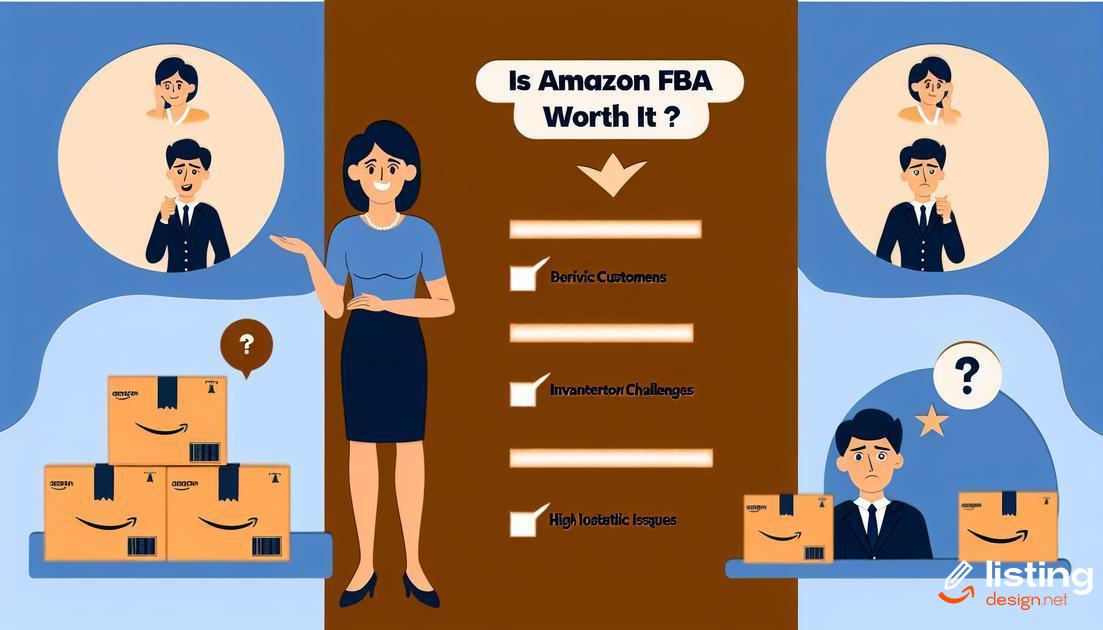Is Amazon FBA worth it? This is a question many new entrepreneurs ask themselves before diving into the world of e-commerce. Amazon FBA, which stands for Fulfillment by Amazon, has become a popular option for sellers looking to expand their reach and leverage Amazon’s logistics. In this article, we will explore the pros and cons, costs, and whether it is the right choice for you.
Table of Contents
What is Amazon FBA?
Amazon FBA stands for Fulfillment by Amazon. It’s a service offering from Amazon that allows sellers to store their products in Amazon’s fulfillment centers. When a customer places an order, Amazon handles the storage, packaging, and shipping of the products. Sellers also benefit from Amazon’s customer service and return handling, which can save them a lot of time and hassle.
Using Amazon FBA, sellers can leverage Amazon’s vast logistics network to reach a larger audience. This service makes it easier for businesses to scale as they don’t have to worry about the complexities of order fulfillment. Moreover, products fulfilled by Amazon become eligible for Amazon Prime, offering fast shipping options that can attract more customers.
However, it is important to understand the associated fees and requirements, such as storage fees, fulfillment fees, and long-term storage fees. Sellers need to calculate these costs to determine if Amazon FBA is a profitable option for their business model.
Advantages of Amazon FBA

Increased Reach
By leveraging Amazon’s vast customer base, sellers can reach millions of potential buyers. This means more visibility and higher chances of making sales. Amazon handles all the logistics like storage, packaging, and shipping, so you can focus on other aspects of your business.
Prime Eligibility
Products fulfilled by Amazon are eligible for Amazon Prime, making them more attractive to Prime members who prefer fast and free shipping. This can result in greater sales volume and customer loyalty.
Customer Service
One of the significant advantages is that Amazon takes care of customer service and returns. This can save sellers a lot of time and hassle, ensuring that customers receive top-notch service. Scalability With Amazon FBA, you can scale your business quickly without worrying about logistics. As your business grows, Amazon’s infrastructure can handle the increased volume effortlessly.
Multi-Channel Fulfillment
Amazon FBA can also manage your orders from other sales channels like eBay and your own website. This centralizes your inventory management and simplifies the fulfillment process.
Storage and Fulfillment
You don’t have to worry about finding warehouse space or hiring staff for order fulfillment. Amazon’s extensive network of fulfillment centers has you covered. Global Expansion Using Amazon FBA, you have the option to sell in international markets with relative ease. Amazon’s global logistics network makes it possible to reach customers around the world, expanding your market reach.
Disadvantages of Amazon FBA
One of the main disadvantages of Amazon FBA is the cost associated with the service. While it provides convenient storage and shipping solutions, it isn’t free. FBA fees include storage fees, fulfillment fees, and optional service fees, which can add up quickly, especially for small businesses or those with low-margin products.
Another issue to consider is loss of control. Using Amazon FBA means you are relying on Amazon to handle your inventory and shipping. If there is a problem with an order, it can be more difficult to resolve since you are not directly handling the product.
Inventory management can also become a challenge. Amazon’s storage limitations might complicate things, especially during peak seasons. If you exceed the allotted space or stock limits, you may face steep penalties and additional fees.
Additionally, there’s the potential for product damage or loss. While Amazon handles the logistics, there’s always a risk of items getting damaged in the warehouse or during shipping. In such cases, you may have to navigate Amazon’s claims process to get reimbursed, which can be time-consuming.
Moreover, using FBA may lead to increased competition. Your product listing will appear alongside many others, potentially from international sellers who may offer similar products at lower prices. This competition can make it harder to stand out and achieve higher sales.
Lastly, there’s the issue of branding. When you use FBA, your products are shipped in Amazon-branded packaging. This can make it difficult to build a unique brand identity, as customers may see your products as just another Amazon purchase.
Costs Involved with Amazon FBA

Understanding the costs involved with Amazon FBA is crucial for any seller considering this fulfillment method. The primary expenses include fulfillment fees, which are charged for picking, packing, and shipping items. These fees vary based on the size and weight of the product.
Additionally, there are storage fees for keeping inventory in Amazon’s warehouses. These costs depend on the volume of your goods and the time of year, with higher rates during the holiday season.
Sellers must also consider long-term storage fees for items stored over 365 days, potentially increasing monthly expenses. Return processing fees are another factor, applied when customers return products.
Other costs include removal and disposal fees if you need to remove or dispose of unsold or damaged items. Lastly, there’s the cost of shipping inventory to Amazon’s fulfillment centers, which can vary based on your location and the delivery method used.
Taking all these costs into account is essential for pricing strategy and profitability when using Amazon FBA.
Success Stories with Amazon FBA
Many entrepreneurs have found remarkable success using Amazon FBA (Fulfillment by Amazon). One such story is Jane’s Journey to Six Figures, where Jane leveraged Amazon’s logistics to scale her home-based business into a six-figure company within a year. She started with a small investment and focused on niche products, showing that even with limited capital, the potential for significant earnings is achievable.
Another inspiring example is Mark’s Million-Dollar Empire. Mark transitioned from a traditional retail background to Amazon FBA and saw his revenue grow exponentially. By harnessing Amazon’s efficient storage and shipping services, he managed to reach customers worldwide and boost his sales beyond his expectations.
A noteworthy mention is the story of The Family Business Transformation. A family-owned business struggling with logistics complexity joined Amazon FBA, and within months, their operational challenges reduced significantly. This allowed them to focus more on product development and customer service, leading to increased brand loyalty and profits.
These success stories underscore the potential of Amazon FBA. Entrepreneurs from diverse backgrounds, whether starting small or transitioning from traditional retail, have found Amazon’s platform to be a game-changer. The common thread in these stories is leveraging Amazon’s robust fulfillment network to handle logistics, giving business owners time to focus on scaling and innovation.
Is Amazon FBA Right for You?

Deciding whether Amazon FBA is the right choice can be a pivotal decision in your e-commerce journey. To make an informed choice, you need to weigh the various aspects discussed below.
Business Goals
Determine your business goals and whether they align with the benefits of Amazon FBA. If rapid growth and international reach are your aims, FBA may be well-suited for you.
Product Type
Certain product types take better advantage of FBA than others. For example, small and lightweight items often benefit more due to lower storage and shipping costs.
Budget Constraints
Costs involved with Amazon FBA can be substantial. It’s vital to evaluate your budget to see if you can sustain these costs, including storage, fulfillment, and referral fees.
Time Commitment
Amazon FBA can free up a lot of your time by handling shipping and customer service, but it’s important to consider if you’re ready for the initial setup and ongoing management it requires.
Competition and Market Research
Understanding your competition is crucial. Highly competitive markets can make it challenging to stand out unless you have a unique product or pricing strategy.
Customer Service
FBA handles most customer service tasks, but retaining some control over customer interactions can be more beneficial depending on your business model.
Tips for Getting Started with Amazon FBA
Research Products and Market Demand
Before you dive into Amazon FBA, it’s crucial to understand the market demand for the products you want to sell. Use tools like Jungle Scout or Helium 10 to analyze current trends and identify profitable niches. This will ensure you are not investing in products that won’t sell.
Setting Up Your Amazon Seller Account
Creating an Amazon seller account is your next step. Choose between an Individual or Professional account based on your business needs. Be meticulous about filling out your profile information and tax details correctly to avoid issues later on.
Source Your Products
Finding reliable suppliers is key to success in Amazon FBA. Options include suppliers from Alibaba, local wholesalers, or even manufacturers. Negotiate the best prices and always request samples to check product quality before placing a large order.
Create an Efficient Listing
Your product listing should be comprehensive and engaging. Use high-quality images, detailed descriptions, and relevant keywords. The goal is to make your product stand out among competitors and appeal to potential customers.
Inventory Management
Proper inventory management ensures you don’t run out of stock. Utilize Amazon’s inventory tools to track your products and predict future sales. You can also set up automatic reordering to maintain a consistent supply.
Optimize for Amazon SEO
Amazon’s search algorithm relies heavily on keywords. Make sure to optimize your product title, bullet points, and descriptions with relevant keywords. This helps improve your product’s visibility on Amazon, increasing your chances of making sales.
Utilize FBA Tools and Resources
Amazon provides various tools to help you succeed with FBA. Take advantage of these resources including their seller forums, guides, and FBA service tools to streamline your operations and optimize performance.
Monitor Performance Metrics
Regularly monitor your sales, customer reviews, and return rates. These metrics can provide valuable insights into what’s working and what needs improvement. Adjust your strategies accordingly to maintain a healthy and profitable FBA business.
Alternatives to Amazon FBA

There are several strong alternatives to Amazon FBA for those looking to diversify their eCommerce operations.
Shopify Fulfillment Network (SFN)
Shopify offers its own fulfillment network which allows you to store, pack, and ship products directly from Shopify’s warehouses. This option integrates smoothly with Shopify stores.
Third-Party Logistics (3PL)
Companies such as ShipBob, Red Stag Fulfillment, and Rakuten Super Logistics are well-known 3PL providers that can handle logistics, warehousing, and shipping.
Direct Shipping
Selling directly from your website and handling your own shipping can offer more control and potentially higher profits. You can use services like FedEx, UPS, or USPS to fulfill orders.
Amazon Seller Fulfilled Prime (SFP)
This program allows you to sell under the Prime badge without using FBA, but you need to meet strict shipping criteria.
Warehousing Solutions
There are various warehousing companies that you can utilize for storing inventory and shipping orders, such as Fulfillment by Sears (FBS) or Deliverr.
Exploring these alternatives can ensure that your eCommerce business remains flexible and can adapt to different market conditions.


